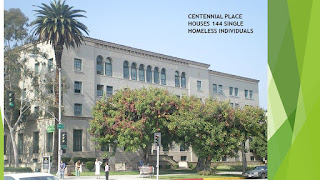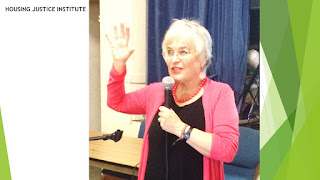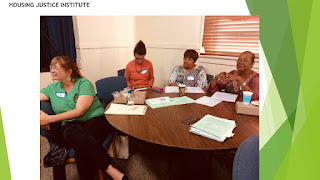What’s your housing story? How did your parents afford a
home or an apartment when you were growing up? How do you afford a home or
apartment today? How has your housing situation influenced your life? These are
some of the questions that we explore in Jill’s Housing Justice Institute and
in our monthly GPHAG meetings. We learn a lot about each other, and how housing influences our lives,
when we reflect on our housing stories.
I’ve done this exercise numerous times and each time I
learn a little more about myself and about housing policy in America. This blog is about what I shared during the most recent GPAHG meeting.
If you want to see a video of the last GPAGH meeting in which Jill and Bert Newton discussed the "Theology of Land and Housing," you can see a livestream of this event at:
 I grew up in Princeton, an elite college town, but the
neighborhood where I grew up did not fit the Princeton stereotype. Instead of college
professors and professionals, my neighborhood was filled with working class
immigrants, mainly Greeks and Italians. Our street was short and narrow, with
gasoline stations and diners on the corner, and had the nickname Pig Turd
Alley. But it was actually a great street on which to raise a family since
homes were side-by-side and had almost no front yards. Instead, there were porches
or “stoops” where families hung out, especially on hot summer nights. Mothers
all knew each other and took turns watching each other’s kids. It felt as if
the whole neighborhood was an extended family. For the first 8 years of my
life, we lived in an apartment and then moved across the street to a fixer upper
that cost around $13,000. That was a lot of money back then since the average
income was $3,600. (Per year, not per month!)
I grew up in Princeton, an elite college town, but the
neighborhood where I grew up did not fit the Princeton stereotype. Instead of college
professors and professionals, my neighborhood was filled with working class
immigrants, mainly Greeks and Italians. Our street was short and narrow, with
gasoline stations and diners on the corner, and had the nickname Pig Turd
Alley. But it was actually a great street on which to raise a family since
homes were side-by-side and had almost no front yards. Instead, there were porches
or “stoops” where families hung out, especially on hot summer nights. Mothers
all knew each other and took turns watching each other’s kids. It felt as if
the whole neighborhood was an extended family. For the first 8 years of my
life, we lived in an apartment and then moved across the street to a fixer upper
that cost around $13,000. That was a lot of money back then since the average
income was $3,600. (Per year, not per month!)
How could we compare that price to today’s home prices? A
good rule of thumb is that you can afford to buy a home that costs no more than
five times your yearly salary. If my father’s yearly salary was, say, $3,000,
he could afford a $15,000 home. So this fixer up was within his price range.
What is the median home price in Princeton today? I checked
ZIlllo and it’s (gulp!) $900,000. To afford to buy a home in Princeton today, you’d
have to earn at least $180,000 a year. The average janitor’s salary in the
Princeton area is $36,000, so no janitor could even imagine buying a home in
Princeton today. In fact, neither could a high school teacher, since their
salaries range from $50,000 -90,000. Princeton University professors can still
afford homes in Princeton since their salaries average around $200,000.
Another reason my immigrant father was able to afford a
home in elite Princeton was due to the Veterans Home Loan Program, which was
created in 1943. My Greek father served in the army during WWII, which is how he
earned his citizenship, and he was therefore eligible for this program. Rather than provide veterans with a cash
bonus to help with purchasing a home, the government decided a loan guaranty
was a more powerful and viable long-term solution. And it worked. Being a vet
enabled my father to obtain a 30-year mortgage and home in which to raise his family.
But the expenses of having a home required that we rent rooms for extra income.
Our house had five small bedrooms and two of them were converted to studios and
rented out. That’s what made our home affordable.
Our neighborhood began to
change in the 1960s when a Princeton University history professor named John Shy moved in next door.
He was a nice guy and my father loved to talk with him about his favorite
topic, history. (He also took me under his wing and gave me a job helping him with research when I was a freshman in high school, but that's another story.)
Having a professor on Pig Turd Alley changed the character of our neighborhood. Once
the first professor dared to move in, others
followed. And soon our little street was no longer affordable to anyone making
less than a Princeton professor’s salary, i.e. $200,000 a year. We didn't have a term for this back then. Today we call it "gentrification."
I became a home owner myself
when I was in my late 40s. I was married to a Methodist pastor and we lived in
parsonages for the first 10 years of our marriage. But when we moved to
Whittier, I convinced my wife we needed to own a home to gain equity for our
retirement. So we bought a condo around the same time that Jill bought her
house in Pasadena. Our condo cost $150,000 and we could afford the down payment
only because my father-in-law gave us $15,000. We also rented out two rooms for
foreign students for around $1200 a month total. That paid for our mortgage and
taxes and helped make our condo affordable. We bought and sold our condo at the
right time and made a profit. With equity from our condo, we purchased a
detached home in Torrance for $450,000 and sold six years later for $650,000—a
month or two before the housing market crashed, when prices were at their peak.
That’s why I was able to retire at age 60 and devote myself to peace and
justice activism.
What helped my family afford a home was a government program that enabled us to buy a home that could be used to generate income as well as raise a family.
What helped my family afford a home was a government program that enabled us to buy a home that could be used to generate income as well as raise a family.
What helped me to purchase our first condo was having a
wife whose father could help us financially, and renting out rooms helped
us to gain equity to purchase a detached home. Now I live with Jill and am able to use some of that equity
to maintain and improve our home as well as make it a model of environmental
sustainability. I feel very blessed to be a homeowner and would like everyone to
have a decent, secure and affordable home. That’s why I work for housing
justice.





























































































